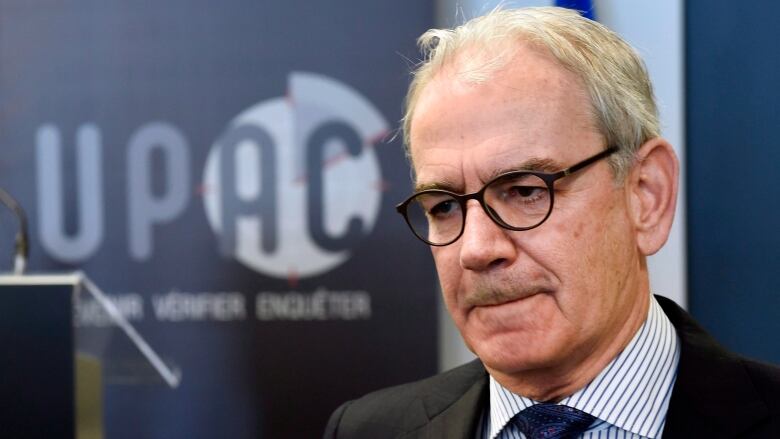UPAC boss Robert Lafrenire muses on progress at 5-year mark
Head of Quebec's anti-corruption unit measures success by more than arrests

One hundred and sixty-four arrests. Two thousandcompanies audited.
Not a bad tally forUPAC, Quebec's anti-corruption unit, after five years in operation.
- A closer look at the Quebec political figures arrested by UPAC
- Former construction contractors face 78 tax-fraud charges for work on Jewish General Hospital
- Turcot Interchange construction firm charged after UPAC probe
- UPAC lays 67 charges against Roche, Pleuritec
But UPAC CommissionerRobert Lafreniresays he measures the unit'ssuccess in more than just arrests, even high-profile ones.
Take, for example,the recent fraud and corruption charges laid against former Liberal deputy premier Nathalie Normandeau, former Liberal minister Marc-Yvan Ct and five others, following a lengthy UPAC investigation.
Lafrenire compares itto evaluating road safety.
"We look at the number of deaths [on the roads], so at the consequences of actions, and not at the number of tickets police officers hand out," he told CBC, while taking time out of a one-day conference aimed at examininghow the fight against corruption is going in Quebec.
Success for his unit, he says, is seeing the cost of public contracts diminish and taxpayersreceiving proper value for their money as authorities crack down on corruption schemes.
Lafrenire points to another indicator of how the unit has evolved: The number of tips UPACreceives for investigators to pursue hassteadily grown over the years, with a current average of 50 a month.
"We started [UPAC] five years ago, with entities that didn't work together, except perhaps Revenu Qubec and the Sret du Qubec," he said. "There was resistance at first, and we had to understand everybody's role. There's still work to be done, but we've come a long way."
Advice from New York experts
Among the speakers at the UPACconference was Quebec's Director of Penal and Criminal Prosecutions, Jose Granchamp, the City of Montreal's inspector general, Denis Gallant and Mark Peters, the head ofNew York City's Department of Investigation (DOI).
The DOI has been tackling corruption in New York's public institutions since 1873, and Peters said constant work and vigilance are critical.
Peters congratulated UPAC for the recent high-profile arrests, calling them"terrific work we saw all the way in New York."
But with that praise came some caution and advice.
"Never lose sight of the fact that, as much as you do, there's always more to do, and you always need to be thinking about what's next," Peters said, adding communication is key.
He said law enforcement authorities and the prosecutor's office must exchange informationfrequently about how to proceed with probes.
In his presentation, Peters also stressed that the focus must be ontargeting systemic problems, rather than individual arrests.
"You can arrest a lot of people,but if you don't begin to look at whatever the systemic corruption vulnerabilities there are behind the arrests, you'll find yourself arresting the same groups of people again and again without making any real progress," he warned.
Hoping for another mandate
Lafrenire's mandate as UPAC commissioner expired on March 28, 2016, just daysafter the arrests of Normandeauand Ct shook the political worldparticularly the Quebec Liberal Party.
- UPACarrests:Boisbriandcleaning up its corrupt past
- LouiseLger-Villandr, ex-Hudson director general, gets 30 months in prison
- Anti-corruption unit seize documents from Quebec justice department's IT office
Amid speculation at the timing of the arrests, thecommissioner has maintained it wascoincidental, since the investigation into the seven people arrested tookyears.
The governmenthas extended Lafrenire'smandate temporarily while officials consider a replacement, but Lafrenire has said he would like to stayfor continuity in the filesand so he can continue the work his unitstarted five years ago.
"I love my job," he said with a laugh. "And I'm not yet finished that job."













_(720p).jpg)


 OFFICIAL HD MUSIC VIDEO.jpg)
.jpg)



























































































